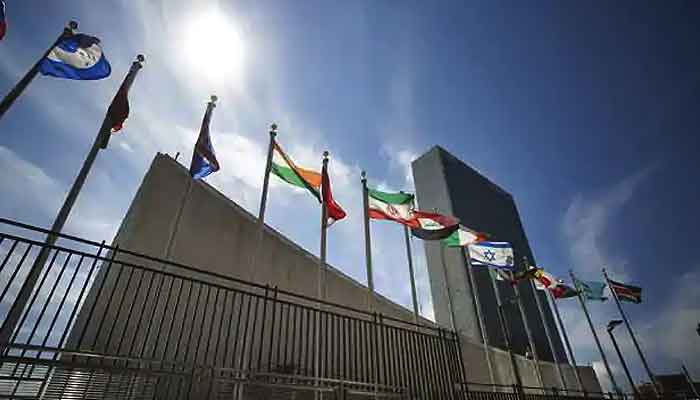Pakistan blocks Indian bid to get permanent UNSC seat
Pakistan has insisted on a definite period of UNSC permanent membership and its election after every two or five years
NEW YORK: Pakistan blocked Indian attempt to win permanent membership of the United Nations Security Council (UNSC) and New Delhi also lacked support of even half of the required number of states at the global forum.
India’s dream of becoming a permanent member of the UNSC dashed as Pakistan’s stance was accepted by the global forum for the continuation of debate on the criteria of the membership.
Pakistan has opposed the awarding of UNSC’s permanent membership to India. Pakistan has insisted on a definite period of UNSC permanent membership and its election after every two or five years.
Pakistan gave its stance that India has always violated the UNSC resolutions. India lacks getting a two-third majority in the UN Charter, whereas, the Indian group also loses the backing of the United States (US), say media reports.
Moreover, India has also failed to meet the criteria for becoming a UNSC permanent member despite claiming to be a secular and strong economy.
India needs the support of 129 member states for becoming a permanent member. Diplomatic sources said that New Delhi has even failed to get the support of even half of the required number of states.
Sources added that Pakistan’s stance was supported by the Arab League and the African Union. Earlier in April, Pakistan had underscored the need for flexibility to achieve the required consensus among all United Nations member states to overcome the stalemate in the long-running negotiations to restructure the UN Security Council.
“The admittedly slow pace of progress in Security Council reform is not due to any deficiency in the process or procedures,” Ambassador Munir Akram said Wednesday in a resumed session of the Inter-Governmental Negotiations (IGN) aimed at making the 15-member Council more effective, representative and accountable.
The reason, he added, was “the inflexibility in the positions of a few individual states which have come into these negotiations with a pre-determined end goal of fulfilling their national ambitions to secure an elevated and privileged position within the Security Council, regardless of the principle of sovereign equality of states”, obviously referring to the relentless campaign by India, Brazil, Germany and Japan, known as G-4, for permanent seats in an expanded Council.
Full-scale negotiations to reform the Security Council began in the General Assembly in February 2009 on five key areas, the categories of membership, the question of veto, regional representation, size of an enlarged Security Council, and working methods of the council and its relationship with the General Assembly.
Progress towards restructuring the Security Council remains blocked as India, Brazil, Germany and Japan continue pushing for permanent seats in the Council, while the Italy/Pakistan-led Uniting for Consensus (UfC) group firmly opposes any additional permanent members.
As a compromise, UfC has proposed a new category of members, not permanent members, with longer duration in terms and a possibility to get re-elected.
The Security Council is currently composed of five permanent members; Britain, China, France, Russia and the United States, and 10 non-permanent members elected to two-year terms.
-
 Why Kate Middleton, Prince William Opt For ‘show Stopping Style’
Why Kate Middleton, Prince William Opt For ‘show Stopping Style’ -
 Here's Why Leonardo DiCaprio Will Not Attend This Year's 'Actors Award' Despite Major Nomination
Here's Why Leonardo DiCaprio Will Not Attend This Year's 'Actors Award' Despite Major Nomination -
 Ethan Hawke Reflects On Hollywood Success As Fifth Oscar Nomination Arrives
Ethan Hawke Reflects On Hollywood Success As Fifth Oscar Nomination Arrives -
 Tom Cruise Feeling Down In The Dumps Post A Series Of Failed Romances: Report
Tom Cruise Feeling Down In The Dumps Post A Series Of Failed Romances: Report -
 'The Pitt' Producer Reveals Why He Was Nervous For The New Ep Of Season Two
'The Pitt' Producer Reveals Why He Was Nervous For The New Ep Of Season Two -
 Maggie Gyllenhaal Gets Honest About Being Jealous Of Jake Gyllenhaal
Maggie Gyllenhaal Gets Honest About Being Jealous Of Jake Gyllenhaal -
 'Bridgerton' Star Luke Thompson Gets Honest About Season Five
'Bridgerton' Star Luke Thompson Gets Honest About Season Five -
 Prince William On Verge Of Breakdown Because Of 'disgraced' Andrew
Prince William On Verge Of Breakdown Because Of 'disgraced' Andrew -
 Tig Notaro Reflects On Oscar Nod For 'Come See Me In The Good Light': 'I Was Sleeping'
Tig Notaro Reflects On Oscar Nod For 'Come See Me In The Good Light': 'I Was Sleeping' -
 Kenyon Sadiq Sets 40-yard Dash Record At NFL Scouting Combine, Eyes First Round
Kenyon Sadiq Sets 40-yard Dash Record At NFL Scouting Combine, Eyes First Round -
 Talk Show Host Drops Hint About Taylor Swift, Travis Kelce Wedding Date
Talk Show Host Drops Hint About Taylor Swift, Travis Kelce Wedding Date -
 Andrew Scandal Brings New Worries For Prince Harry, Meghan Markle
Andrew Scandal Brings New Worries For Prince Harry, Meghan Markle -
 King Charles Imposes New Restrictions On Ex-Prince Andrew In Surprise Move
King Charles Imposes New Restrictions On Ex-Prince Andrew In Surprise Move -
 Chris Hemsworth Reveals How Elsa Pataky Guides His Career Moves
Chris Hemsworth Reveals How Elsa Pataky Guides His Career Moves -
 Was Travis Barker In A Relationship With Kim Kardashian Before Marrying Her Sister?
Was Travis Barker In A Relationship With Kim Kardashian Before Marrying Her Sister? -
 Brad Pitt Feeling Down In The Dumps After Kids' Snubs As Pals Continue To Paint Angelina Jolie A Villain
Brad Pitt Feeling Down In The Dumps After Kids' Snubs As Pals Continue To Paint Angelina Jolie A Villain




